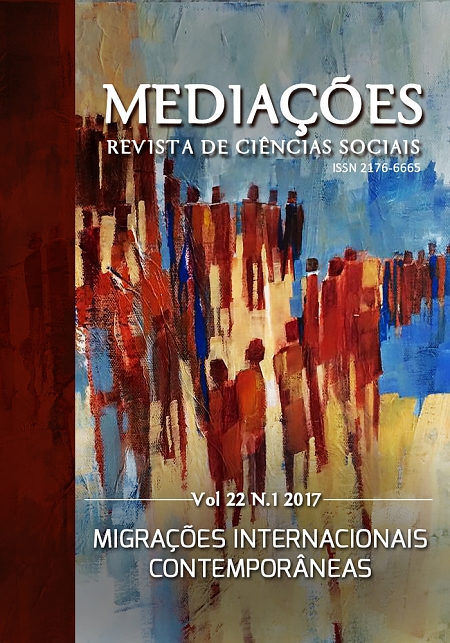The West African immigrant as the undesirable? about the racialization process in Cape Verde
DOI:
https://doi.org/10.5433/2176-6665.2017v22n1p105Keywords:
Immigration, West African immigrant, Racialization, Cape VerdeAbstract
The aim of this article is to reflect on a "new reality" that the Cape Verdean society has known since the 1990s as regards migration, especially to the presence of immigrants from West Africa. Therefore, we resort to a set of stories, rumors and other materials that have emerged on these subjects allowing some discourses coupled to the dynamics of identity, difference and representation. Thus, it is an essay about the processes of racialization in the immigration context where both the Cape Verdean as the West African immigrant are racialized.Downloads
References
ALMEIDA, Miguel Vale de. Crioulidade e fantasmagoria. ENCONTRO ANUAL DA ANPOCS, 28., Caxambu, 2004. Papers... Caxambu: ANPOCS, 2004. Disponível em: http://www.anpocs.com/index.php/encontros/papers/28-encontro-anual-daanpocs. Acesso em: 18 nov. 2012.
ANJOS, José Carlos G. Intelectuais, literatura e poder em Cabo Verde: lutas de definição da identidade nacional. Porto Alegre: Ed. UFRGS/INIPC, 2002.
ANJOS, José Carlos G. Sexualidade juvenil de classes populares em Cabo Verde: os caminhos para a prostituição de jovens urbanas pobres. Revista Estudos Feministas, Florianópolis, v. 13, n. 1, p. 163-177, jan.-abr. 2005.
ARENDT, Hannah. The origins of totalitarianism. Orlando: Harcourt, 1976.
BANTON, Michael. A ideia de raça. Lisboa: Ed. 70, 2010.
BAROT, Rohit; BIRD, John. Racialization: the genealogy and critique of a concept. Ethnic and Racial Studies, London, v. 24, p. 601-618, n. 4, 2001.
BATALHA, Luís. A elite portuguesa-cabo-verdiana: ascensão e queda de um grupo colonial intermediário. In: CARVALHO, Clara; CABRAL, João de Pina (Coord.). A persistência da história. Passado e Contemporaneidade em África. Lisboa: Imprensa de Ciências Sociais, Universidade de Lisboa, 2004.
BENHABIB, Seyla. The rights of others: aliens, residents and citizens. Cambridge: Cambridge University Press, 2004.
BHABHA, Homi. O local da cultura. Belo Horizonte: Ed. da UFMG, 1998.
CABO Verde Islâmico" preocupa alguns sectores da sociedade. Liberal, 25 mar. 2012. Disponível em: http://liberal.sapo.cv/noticia.asp?idEdicao=64&id=27911& idSeccao=525&Action=noticia. Acesso em: 18 nov. 2012.
BRAH, Avtar. Cartographies of diaspora: contesting identities. London: Routledge, 1996.
CABRAL, Iva et al. Cabo Verde, uma experiência colonial acelerada (século XVI-XVII). Disponível em: http://www.portaldoconhecimento.gov.cv/ bitstream/10961/358/1/Cabo%20Verde%20Uma%20Experi%C3%AAncia%20 Colonial%20Acelerada%20(Sec.XVI-XVII).pdf. Acesso em: 3 out. 2012
FANON, Frantz. Los condenados de la Tierra. México: Fondo de Cultura Económica, 1963.
FANON, Frantz. Pele negra, máscaras brancas. Salvador: Ed. da UFBA, 2008.
FERNANDES, Gabriel. A diluição de África: uma interpretação da saga identitária cabo-verdiana no panorama político (pós) colonial. Florianópolis: Ed. da UFSC, 2002.
FURTADO, Clementina. Imigração e mercado de trabalho em Cabo Verde: atitudes e representações recíprocas. In: CONGRESSO LUSO-AFRO-BRASILEIRO DE CIÊNCIAS SOCIAIS, v. 11., 2011, Salvador. Anais... Salvador: UFBA, 2011.
GILROY, Paul. Entre campos: nações, cultura e o fascínio da raça. São Paulo: Annablume, 2007.
HALL, Stuart. A identidade cultural na pós-modernidade. Rio de Janeiro: Ed. DP&A, 2005.
HALL, Stuart. Introducción: quién necesita "identidad"? In: HALL, Stuart; DU GAY, Paul. Cuestiones de identidad cultural. Buenos Aires: Amorrortu, 2003.
INSTITUTO NACIONAL DE ESTATÍSTICA - INE. Inquérito multi-objectivo contínuo: migrações 2013. Santiago, Cabo Verde, 2014.
INSTITUTO NACIONAL DE ESTATÍSTICA - INE. IV recenseamento geral da população e de habitação: censo 2010. Disponível em: http://www.ine.cv/censo/files/ Resumo%20indicadores%20RGPH%202010.pdf. Acesso em: 1 jan. 2013.
JEFFRIES, Michael P. Thug life. Race, gender and the meaning of hip-hop. Chicago: The University of Chicago Press, 2011.
LIMA, Redy. Thugs: vítimas e/ou agentes da violência? Direito e Cidadania, n. 30, v Número Especial, Praia, Ano XI, 2010.
MILES, Robert. Racism. Londres: Routledge, 1989.
MILES, Robert; BROWN, Malcolm. Racism. London: Routledge, 2003.
MUDIMBE, Valentin Y. The invention of Africa. Gnosis, philosophy, and the order of knowledge. Bloomington: Indiana University Press, 1988.
PINA, Alírio Dias de. Cabo Verde não pode compactuar com fenómenos que perturbam a ordem internacional. A Semana, Praia, Cabo Verde, 25 fev. 2005. Comunicação Social.
ROCHA, Eufémia Vicente. Cabo-verdianos e mandjakus: experiências outras de circulação. In: FURTADO, Cláudio. Diálogos em Trânsito: Brasil, Cabo Verde e Guiné Bissau em narrativas cruzadas. Salvador: EdUFBA, 2012.
ROCHA, Eufémia Vicente. Feitiçaria e mobilidade na África Ocidental: uma etnografiada circulação de méstris, kórda e korderus. 2014. Tese (Doutorado em Ciências Sociais) - Universidade de Cabo Verde, Praia - Cabo Verde., 2014.
ROCHA, Eufémia Vicente. Mandjakus são todos os africanos, todas as gentes pretas que vêm da África: xenofobia e racismo em Cabo Verde. 2009. Dissertação (Mestrado em Ciências Sociais) - Universidade de Cabo Verde, Cabo Verde., 2009.
SAYAD, Abdelmalek. A imigração ou os paradoxos da alteridade. São Paulo: EDUSP, 1998.
SCHUCK, Peter H. Law and the study of migration. In: BRETTELL, Caroline B.; HOLLIFIELD, James F. Migration theory: talking across disciplines. New York: Routledge, 2000.
WACQUANT, Löic. O estigma racial na construção do Estado punitivo americano. Configurações, Braga, n. 5-6, p. 41-54, 2009.
WADE, Peter. Raza y naturaleza humana. Tabula Rasa, Bogotá, n. 14, p. 205-226, jan./jun. 2011.
WADE, Peter. The presence and absence of race. Patterns of Prejudice, Abingdon, v. 44, n. 1, p. 43-60, 2010.
WOODWARD, Kath. Questioning identity: gender, class, ethnicity. London: Routledge, 2004.
YUVAL-DAVIS, Nira. Theorizing identity: beyond the 'us' and 'them' dichotomy. Patterns of Prejudice, Abingdon, v. 44, n. 3, p. 261-280, 2010.
Downloads
Published
How to Cite
Issue
Section
License
Copyright (c) 2017 Eufémia Vicente Rocha

This work is licensed under a Creative Commons Attribution 4.0 International License.
Copyright on articles published in Mediações belongs to the author(s): in the case of partial or entire republication of the original publication, we ask author(s) to indicate the original publication in the periodical.
Mediações uses the Creative Commons Attribution 4.0 International license, which allows Open Access, enabling any user to read, download, copy and disseminate its content so long as adequately referenced.
The opinions expressed by the author(s) are their sole responsibility.
































